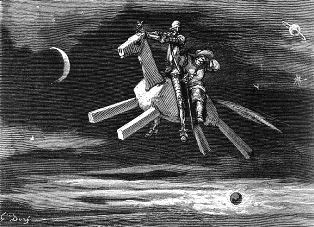 Don Quixote de la Mancha
Don Quixote de la Mancha, by Miguel de Cervantes, changed the way Spain thought about itself. It also made Spain reject any sort of non-realism in fiction, such as science fiction and fantasy, for centuries to come.
Published in 1605, the novel
Don Quixote tells the story of a poor, elderly nobleman driven mad by the fantasy novels of his day, which depicted brave knights and their dazzling deeds. The nobleman adopts the name Don Quixote and sets off on quests. In chapter VIII he famously mistakes windmills for terrible giants and attacks them. In chapter XLI, he is tricked into believing that an enchanted wooden horse has the power to carry him and his squire Sancho Panza through the sky.
Cervantes’s novel appeared when Spain was in a period of
desengaño or “disillusionment” after imperial losses, government bankruptcy, a deadly plague, failed harvests, economic disaster, and the defeat of the Invincible Armada. The nation had attempted to fulfill grand ambitions only to discover that it had been tilting at windmills. The novels that Cervantes’s fictional character read were real books that had, a generation earlier, inspired the conquistadors in their exploits: the state of California is named after an imaginary caliphate in one of those books,
The Exploits of Espandian, which was the sequel to
Amadis of Gaul
. Ambition was not enough, though, and eventually fantasy gave way to sad reality.
Don Quixote changed the way Spain thought about itself — and about literature.
“The problem with Spanish science fiction starts with
Quixote,” the editor of a Spanish science fiction ‘zine told me. “Of course, it was a satire of the fantasy adventure novels of its day, and ever since then, perhaps because the satire was so biting, Spain has been the home of realism in fiction.”
School children were taught to scorn those novels of chivalric quests, speculation, and mysterious unknown lands, if they were taught about them at all. Still, a few writers always experimented with science fiction and fantasy, and in the 20th century, books from outside Spain began to inspire a generation.
“Fantastic” literature — science fiction, fantasy, and horror — was slow to gain acceptance as worthy literature, but in the 1980s and 1990s a growing number of authors encouraged each other and carved out a niche. In the 21st century, books like the
Harry Potter and
Twilight series appealed to massive numbers of young readers, to the surprise of established publishers and to the delight of the small publishers who had taken a chance on those novels and cashed in.
Just as in the English-speaking world, Spanish “mainstream” literature still remains leery of too much imagination. But it can no longer bar the door to respectability. Readers have had their say.
— Sue Burke
 newest »
newest »
 newest »
newest »
 One of the reasons I began to study Spanish in junior high school was because I realized that if I spoke Spanish and English, I could talk to most of the people on the planet. That was an exciting idea, and the number of potential conversations keeps getting bigger.
One of the reasons I began to study Spanish in junior high school was because I realized that if I spoke Spanish and English, I could talk to most of the people on the planet. That was an exciting idea, and the number of potential conversations keeps getting bigger.
 It's worth noting that, when I went to pick Spanish for the language requirement at Rice (in Houston), back in the late Pleistocene, I was told no. Only German or French! Spanish is to talk to your servants! (unstated, but real, reason). Texas!
It's worth noting that, when I went to pick Spanish for the language requirement at Rice (in Houston), back in the late Pleistocene, I was told no. Only German or French! Spanish is to talk to your servants! (unstated, but real, reason). Texas!




I doubt much of the magic in 'magic realism' comes from the native traditions the conquistadors would've encountered, but here is probably more native tradition in the literature now, as there are more natives writing it - Mayan comics, for example.
And by 2040, I think it is, Spanish will have the most native speakers of any language. who would've thought it? Cortes and Cervantes, maybe...